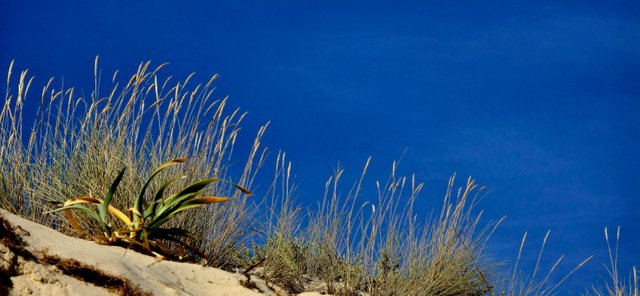Contemplating Nature and Its Impact on the Human Spirit
I recently had the fortune of visiting a vast ocean beach with some friends. It was a sunny day, clear of clouds, but incredibly windy. To shield ourselves from the wind, we positioned ourselves a little farther from the beach access, where sand dunes began. It was a simple yet powerful sight for me, and in a moment of calm, listening to the sound of the waves and the wind, I snapped this photo.
Upon reflecting on it, I thought it was worth delving a little deeper into the image.

Technical and Content Analysis
Technical Details
- Resolution: 5886x2718 pixels, 16MP
- ISO: 32
- Focal Length: 115mm
- Exposure: 0.0 ev
- Aperture: F3.4
- Shutter Speed: 1/11111 s
The photograph captures a corner of natural vegetation emerging from a sandy hill, with a deep, serene blue sky in the background. The image clarity is high, thanks to the low ISO and very short exposure time, which prevent noise and motion blur, respectively. The 115mm focal length compresses the perspective, bringing the vegetation to the foreground without excessively distorting the background. The F3.4 aperture provides a moderate depth of field, keeping both the foreground plant and the background grasses in focus.
Image Description
The scene presents a hill covered in vegetation, with succulent plants and grasses standing out against a deep, uniform blue sky. The vegetation appears vibrant and healthy, with sharp details and vivid colors that strongly contrast with the sky. The compositional simplicity of the image, with a few well-defined elements, conveys a sense of purity and tranquility.
Mental State Represented
Benevolent Effect of Nature on the Spirit and Mind
The image evokes a mental state of serenity and well-being, associated with observing nature. The connection with nature has often been studied and documented for its psychological and physiological benefits.
Serenity and Tranquility
The vast blue sky represents infinity and calm, invoking inner peace. The presence of an undisturbed natural environment and the purity of the cloudless sky provide a sense of freedom and mental relaxation. This can be linked to stress reduction and the promotion of calm, as described in Edward O. Wilson's theories of biophilia, which suggest that humans have an innate connection to nature that is essential for their well-being.
Edward O. Wilson was an American biologist, naturalist, and writer known for his pioneering work in sociobiology, biodiversity, and conservation. In his 1984 book, "Biophilia," he defines it as "the innate affiliation of human beings with other forms of life and nature." He argues that humans have an innate tendency to seek connections with nature and other life forms, an instinct rooted in our evolution. This theory explains why contact with nature can positively impact our mental and physical health. Research has shown that spending time outdoors in natural settings can reduce stress, enhance mood, boost creativity, and even speed up recovery from illnesses. It emphasizes the importance of maintaining this connection for the psychological and physiological well-being of individuals and for environmental conservation. Photography that captures natural elements can evoke and reinforce this innate bond, offering a moment of reflection on our connection to the natural world and the implications of this bond for our daily lives and future.
Vitality and Renewal
The lush vegetation represents life and renewal, presenting a display of growth and vitality that can inspire optimism and positive energy. The contrast between the arid sand and the lush plants highlights nature's ability to thrive even in adverse conditions, symbolizing resilience and hope. This concept is well explored in the works of Henry David Thoreau, who, in his writings about Walden Pond, speaks of the importance of immersing oneself in nature to renew the spirit and find inspiration.
Henry David Thoreau was an American philosopher, poet, and naturalist, born in 1817 and passed away in 1862. In "Walden," Thoreau recounts his experiment in simple living and self-sufficiency in nature, an experience that lasted two years, two months, and two days. Through this narrative, Thoreau explores themes of resilience, hope, and spiritual renewal. His works offer a powerful vision of nature as a source of resilience and hope. His philosophy invites us to reevaluate our relationship with the natural environment and recognize the intrinsic value of a simple and contemplative life. In an increasingly hectic and technologically advanced world, Thoreau's lessons remain relevant, reminding us that nature can provide us with peace, strength, and inspiration to face life's challenges.
Contemplation and Reflection
The simplicity and natural beauty of the image invite contemplation. Viewing this scene prompts reflections on nature's role in our lives and the importance of preserving it. Martin Heidegger, in his essay "Building, Dwelling, Thinking," explores the concept of dwelling in the world in harmony with nature, suggesting that a return to a more authentic and contemplative experience of nature can enrich our being.
Conclusion
This image visually represents a mental state of serenity, vitality, and reflection, showing how observing nature can positively influence the human spirit. The theories of philosophers like Edward O. Wilson, Henry David Thoreau, and Martin Heidegger enrich this analysis, providing a deeper understanding of how our connection with nature can promote psychological well-being, offer inspiration, and encourage a more contemplative and authentic life. The photograph, with its simple yet powerful composition, invites viewers to immerse themselves in this state of calm and reflection, reminding us of the importance of preserving and appreciating the natural beauty that surrounds us.